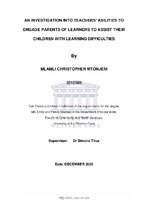| dc.contributor.advisor | Titus, Simone | |
| dc.contributor.author | Mtonjeni, Mlamli Christopher | |
| dc.date.accessioned | 2021-03-25T12:44:10Z | |
| dc.date.available | 2021-03-25T12:44:10Z | |
| dc.date.issued | 2020 | |
| dc.identifier.uri | http://hdl.handle.net/11394/8056 | |
| dc.description | Magister Artium (Child and Family Studies) - MA(CFS) | en_US |
| dc.description.abstract | Parental involvement in the process of implementing inclusive education is one of the major considerations for ensuring support, especially to learners with learning difficulties. The involvement of parents in their children’s education has been found to have a positive contribution and results in good learning outcomes. In the South African context, the Education White Paper 6 (EWP 6) and the policy on Screening, Identification, Assessment and Support (SIAS) emphasizes the importance of the role of parents in the process of implementing inclusive education. This study aimed to explore the ability of teachers to engage parents to assist their children with learning difficulties. A qualitative research method with a phenomenological research design was deemed suitable for the nature of this study with Bronfenbrenner’s bio-ecological systems theory as a theoretical lens to underpin this study. | en_US |
| dc.language.iso | en | en_US |
| dc.publisher | University of Western Cape | en_US |
| dc.subject | Learner | en_US |
| dc.subject | Learning difficulties | en_US |
| dc.subject | Barriers to learning | en_US |
| dc.subject | Inclusive education | en_US |
| dc.subject | Parental involvement | en_US |
| dc.subject | Parental engagement | en_US |
| dc.title | An investigation into teachers’ abilities to engage parents of learners to assist their children with learning difficulties | en_US |
| dc.rights.holder | University of Western Cape | en_US |

